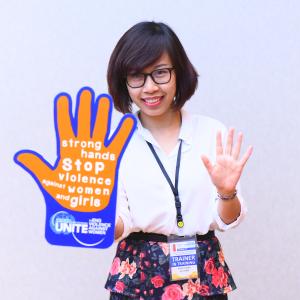UN Women and Australia launch a project to provide recovery support for women at risk of violence in Ho Chi Minh City and Tien Giang
16 June 2022
Ho Chi Minh City, 2 June 2022 – The Embassy of Australia and UN Women Viet Nam today announced a one-year project to provide recovery support for vulnerable women in Ho Chi Minh City and Tien Giang province. These provinces were two of the areas most affected by COVID-19 and are at high risk of natural disasters in the South of Viet Nam.
The project aims to enhance the resilience of women as they recover from the impacts of the COVID-19 pandemic, and to boost the capacity of local service providers to respond to women at risk of violence in an emergency setting. An estimated 8,000 women in HCMC and Tien Giang province who are poor or near-poor, unemployed or have lost their income, and are at higher risk or survivors of violence and abuse, will benefit from cash transfers and technical assistance for livelihood recovery.
“The COVID-19 pandemic has slowed progress towards achieving the Sustainable Development Goals and has exacerbated pre-existing inequalities and disparities including gender issues in Viet Nam,” said Elisa Fernandez Saenz, UN Women Representative in Viet Nam at the launching event of the project. “Women’s loss of employment and income and increased unpaid care responsibilities has only served to underscore inequality in gender roles and the increase of women’s economic dependence and vulnerability.” She emphasized that economic stress, disaster-related instability, and limited access to, or knowledge of, services are known to increase the risk of violence against women and children.
The second survey on the National Prevalence of Violence Against Women conducted in 2019 found that two in three women or 62.9%,[1] who self-identified as ever being married, had experienced violence at the hands of their husbands in their lifetime. Around half, 49.6%, of the women interviewed who reported having experienced violence had never told anyone, and 90.4% did not seek professional support. Due to COVID-19, women’s labor force participation rate fell 8 points between 2019 and 2021, from 70.9% to 62.3%. COVID-19 contributed to a reduction in working hours for women, and the loss of jobs across manufacturing and services. A rapid assessment conducted by UNICEF, UNFPA and UN Women with the support of DFAT in 2021 found that women and children, in particular, were at greater risk during the period of social isolation. The study found that more than one in three women in Viet Nam experienced at least one form of violence during the pandemic, with more women reporting experiencing controlling behaviors and economic violence.
“This project addresses the intertwined issues of women at risk of violence and women with insecure incomes. Our goal is to support women to be more resilient, in their incomes and in their ability to access the support they need to be safe and prosperous,” said Australian Ambassador H.E Robyn Mudie. “We expect that this comprehensive support will assist them in this recovery period and that lessons from the program can be used to improve emergency response and recovery in the future.”
The new project will equip the beneficiaries with knowledge and life skills to cope with gender-based violence and information on how to seek available services and support. By the end of the project in March 2023, it is expected that 5 million people will have increased their awareness of issues related to Gender Equality and Gender-Based Violence. The project interventions are also designed to enhance the capacity of about 2,000 key service providers to respond effectively 24/7 to women’s needs in an integrated manner, following the guidance of the United Nations’ Essential Services Package (ESP) for victims of violence against women and children.
Mrs Lam Thi Ngoc Hoa, Standing Vice President, Ho Chi Minh City Women's Union shared that the COVID-19 epidemic in Ho Chi Minh City has directly affected people's lives, especially families with difficult circumstances: lost livelihoods, job loss, no income, orphans, etc. “Although the City has been proactive, solutions to recover economic development and mobilize social security, especially support for affected women and children has not reached all those who need assistance. Therefore, there is still a great need for programs and projects to support more women and children to help them recover from the COVID-19 epidemic”, she said.
[1] Assessment on gender equality issues in the Country Gender Equality Profile (CGEP) developed by UN Women, DFAT, ADB, and ILO in 2021


